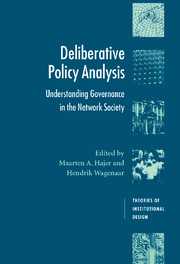Book contents
- Frontmatter
- Contents
- List of contributors
- List of figures
- List of tables
- Preface
- Introduction
- Part I Policy conflict and deliberation in the network society
- Part II Rethinking policy discourse
- 4 Democracy through policy discourse
- 5 Understanding policy practices: action, dialectic and deliberation in policy analysis
- 6 Reframing practice
- Part III Foundations of deliberative policy analysis
- References
- Subject index
- Author index
4 - Democracy through policy discourse
Published online by Cambridge University Press: 22 September 2009
- Frontmatter
- Contents
- List of contributors
- List of figures
- List of tables
- Preface
- Introduction
- Part I Policy conflict and deliberation in the network society
- Part II Rethinking policy discourse
- 4 Democracy through policy discourse
- 5 Understanding policy practices: action, dialectic and deliberation in policy analysis
- 6 Reframing practice
- Part III Foundations of deliberative policy analysis
- References
- Subject index
- Author index
Summary
The word policy has acquired such strong technocratic overtones that the idea of pursuing democracy through policy discourse may seem puzzling, if not inherently contradictory. Of the polis family of words, policy occupies the middle position in a threesome – located somewhere between politics and police. Here the latter term needs to be understood not in its narrow contemporary meaning, however, but in the early modern sense of social control and regulation (see Heidenheimer 1986; cf. Foucault 1991a). In the latter half of the twentieth century, policy took on much of the old sense of police, though with a new, distinctly technocratic accent. Policy came to be viewed as something that was – or should be – removed from politics (see Torgerson 1986a).
This essay, nonetheless, pictures policy discourse as a potential means of democratization. The prospect is that democracy might be enhanced not against or in spite of policy discourse, but through it. For, with the advent of reflexive policy discourse, it becomes increasingly possible to contest the meaning of policy and draw it into closer association with politics – particularly a democratic politics at odds with technocratic policy discourse. The prospect of democratic policy discourse becomes conceivable.
Any potential for democratization has to depend on much more, of course, than a change in policy discourse. The potential depends on context. We thus find ourselves returning to what Harold D. Lasswell, when advancing a policy focus in the social sciences, long ago stressed as central.
- Type
- Chapter
- Information
- Deliberative Policy AnalysisUnderstanding Governance in the Network Society, pp. 113 - 138Publisher: Cambridge University PressPrint publication year: 2003
- 29
- Cited by



